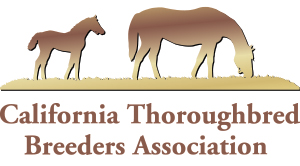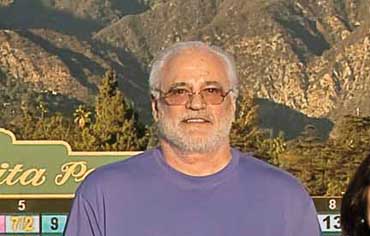By Emily Shields
“I had a fantasy my entire life of one day being a sports franchise owner,” said Scott Gross. “But you have to be a billionaire to do that. Owning racehorses is just like being a franchise owner, except it’s affordable.”
Gross is 22 years into a journey that has seen him rise from state-bred maiden races to the Breeders’ Cup. Along the way he has been involved in various partnerships with close friends John Harris and Mark Devereaux. The latter is Gross’ partner on the grade II-winning California-bred Big Bane Theory.
Although retired now, Gross was once a health care entrepreneur, working in hospital and outpatient services management. Before that, he went to Vietnam fresh out of high school, serving as a ranger medic.
“I had to be careful that when I retired, I wasn’t just sitting around betting all the time,” Gross said.
An avid horseplayer, Gross has “hit a couple of huge Pick 6 tickets,” and he admits that he loves all sorts of exotic wagers. “Like my friend John Harris says, the only thing worse than a losing bet is no bet at all.”
California Thoroughbred Breeders Association board member Harris introduced Gross to the game more than two decades ago. “He is the ultimate racing enthusiast,” Harris said. “It’s wonderful when good things happen to good people.”
“I’ve had the usual ups and downs that a normal owner has,” Gross said. “There were some good horses and some disappointing years.”
Gross and Harris partnered on several classy stakes horses, such as 2008 California Cup Distance Handicap winner and $199,596-earner Distant Victory. Their friendship and business relationship came to a head with the feats of the horse Harris named after them – John Scott.
Harris and Gross bred the son of Bertrando—Henlopen, by Deputy Minister, and he won his first two starts, including the $100,000 I’m Smokin Stakes. After finishing fourth in the Norfolk Stakes (gr. I), Cal-bred John Scott dealt with numerous setbacks that left him off the track from October 2009 until April 2012. After the first comeback race he went right back to winning and reeled off consecutive allowance scores.
John Scott finished second, beaten only a half-length, to grade I winner Rail Trip in the $200,000 San Diego Handicap (gr. II). Off that effort, he finally scored his second stakes win, three years after the first, when he took the $106,460 Harry F. Brubaker Stakes against open company. He capped the season by running fourth as a 12-1 shot in the $909,000 Breeders’ Cup Dirt Mile (gr. I).
After winning the $100,750 Crystal Water Stakes, John Scott suffered yet another setback and was eventually retired in March 2014. The gelding had won six of 12 starts with a second and two thirds for earnings of $460,304.
Mark Devereaux was watching his good friend Gross enjoy the pomp and circumstance that come with racing, and, after putting his kids through college, he was eager to join.
“We’ve been partners in horses for eight or nine years now,” Gross said. “Our approach has been to breed to race.”
Gross and Devereaux have made that plan work.
“We haven’t had to buy a horse in seven years,” Gross said. “We bought a couple of broodmares, raced their offspring, and now we’ve bred back some of the fillies that were born to those original broodmares.”
One of those mares was Shebane, a French stakes winner by Alysheba out of the non-winning Seattle Slew mare Belle Sultane. Shebane was in foal to NetJets Breeders’ Cup Mile (gr. IT) winner Artie Schiller at the time, and the partners had to go to $40,000 to get her at the 2008 Keeneland November mixed sale.
The resulting foal was a colt born Jan. 24, 2009. He was named Big Bane Theory, not for the popular television comedy but for the scientific theory, because Devereaux wanted him to “burst onto the scene.”
Big Bane Theory did just that, breaking his maiden on Santa Anita’s downhill turf course with an explosive rally from mid-pack to win his second start Oct. 11, 2012.
He backed that up with an allowance win going nine furlongs four weeks later but found the $250,000 Hollywood Derby (gr. IT) a bit tough and finished ninth.
At 4, Big Bane Theory won an allowance optional claimer against open company and finished fourth in the $250,500 Citation Handicap (gr. IIT) in November, but then injury left him on the sidelines until Aug. 30, 2014.
Big Bane Theory returned to the races better than ever. Conditioner Carla Gaines had him primed for his return trip, despite the fact he would be contesting the $98,650 Harry F. Brubaker, the same race John Scott had won two years before. With a wide trip, Big Bane Theory rallied a couple of times but just missed by a head to Blue Tone.
“He darn near won it,” Gross recalled. “We knew he had a big race in him. He kept having unfortunate trips, where he would get stopped in the stretch or go wide, and he only lost by narrow margins.”
Big Bane Theory finally put it all together in the $201,500 City of Hope Mile Stakes (gr. IIT), Santa Anita’s final prep race for the Breeders’ Cup Mile. Against a deep field of 10 rivals, Big Bane Theory rolled from mid-pack to win by 1 1⁄2 lengths under Joe Talamo.
Despite the big win, Big Bane Theory was not given a spot in the oversubscribed Breeders’ Cup Mile, and instead had to settle for the $920,000 Breeders’ Cup Dirt Mile (gr. I). Gaines resisted the idea and wanted to bypass the race altogether, but Gross and Devereaux had other ideas.
“The Breeders’ Cup is the Olympics of horse racing,” Gross said. “For us, winning that race was like making the Olympic team. Clockers and guys who got on him in the morning had been encouraging us to try him on the dirt anyway.”
With an outside post, Big Bane Theory finished a solid fifth in the Dirt Mile at 26-1 behind winner Goldencents. With $365,640 in earnings and four wins in 13 starts, Big Bane Theory has already given his owners an amazing ride. He is scheduled to race in 2015. Beyond that, his pedigree and race record make him an exciting regional sire prospect.
“We always have Cal-bred breeders’ bonuses in mind,” Gross said. “We make sure that we handle the breeding season in such a way that our horses are always eligible for those awards. There have been a few allowance wins where if you factor the breeders’ bonus into it, it’s the same as winning a small stakes.
“Being in this sport has been the most rewarding experience of my life. It’s more than just winning and losing, and you’ll lose more than you win. It’s being involved with a great community, the festivities around the big races, the agony of defeat, and the thrill of victory!”
And a horse like Big Bane Teory helps.
“We’re looking for his next stakes start,” Gross said. “He’s been a thrill for me, my partner, and my family.”


